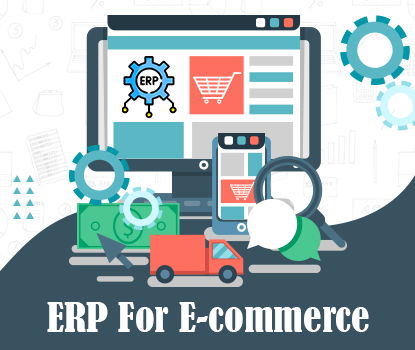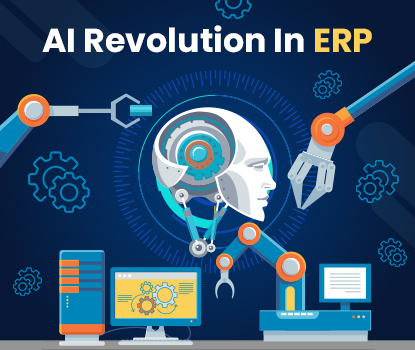In a world where the ERP software market is projected to reach $49.5 billion by 2025 and 95% of businesses report improved processes after ERP implementation, understanding the AI revolution in ERP is not just a consideration—it's a necessity. Have you ever wondered how AI, with its unprecedented capabilities, is poised to transform the way businesses manage their resources and operations?
As we stand on the brink of an AI-driven evolution in ERP, the questions abound: How will artificial intelligence revolutionize ERP systems? What benefits will it bring to businesses in terms of efficiency, productivity, and competitiveness? What challenges and opportunities lie on the horizon for organizations that embrace this transformative technology?
Let's explore the possibilities AI Revolution in ERP offers, and equip businesses to harness the full potential of this technological wave. It's your opportunity to stay ahead of the curve and lead your organization into a new era of efficiency and innovation.
Uses of AI in ERP
Artificial Intelligence (AI) is rapidly redefining the landscape of Enterprise Resource Planning (ERP) systems, offering a wide range of benefits to businesses. Here are some key statistics highlighting the use of AI in ERP:
-
AI-Powered Automation
AI enables automation of routine tasks within ERP systems. This results in a significant reduction in manual data entry and repetitive processes. According to Forbes, AI automation can reduce ERP-related errors by 70%.
-
Improved Decision-Making
AI's data analytics and machine learning capabilities empower ERP systems to provide real-time insights and predictive analytics. This, in turn, enhances decision-making within organizations. A survey by Deloitte found that 80% of business leaders believe that AI improves decision-making.
-
Efficiency Gains
The integration of AI into ERP systems leads to substantial efficiency gains. AI-driven automation can help organizations save time and resources. According to IDC, AI will enable a 20-30% improvement in ERP system productivity by 2024.
-
Personalized User Experiences
AI enhances user experiences within ERP software. It can tailor interfaces and processes to individual user preferences, leading to increased user satisfaction. Gartner predicts that by 2025, 50% of large enterprises will have successfully personalized their ERP experiences.
-
Enhanced Security
AI strengthens security measures in ERP systems by identifying and mitigating potential threats. It can detect anomalies and patterns indicative of cyberattacks. In fact, 55% of organizations are expected to increase their investments in AI for security by 2025, according to IDC.
-
Predictive Maintenance
AI and IoT integration in ERP systems enable predictive maintenance for equipment and machinery. This can lead to a 25% reduction in maintenance costs and a 70% decrease in downtime, as reported by McKinsey.
-
Supply Chain Optimization
AI-driven ERP can optimize supply chains by predicting demand, managing inventory efficiently, and enhancing logistics. A survey by Accenture reveals that 76% of supply chain executives believe that AI will be disruptive to their industry.
-
Cost Savings
AI's ability to automate tasks and optimize processes can result in substantial cost savings. A report by Capgemini states that AI can lead to cost reductions of up to 15% in business processes and up to 30% in IT operations.
-
User Adoption
AI-powered ERP systems are more user-friendly and intuitive, leading to better user adoption rates. This ensures that the ERP systems are fully utilized. By 2025, Gartner predicts that 65% of large enterprises will have successfully boosted user adoption by incorporating AI in ERP.
-
Competitive Advantage
Businesses that effectively leverage AI within their ERP systems gain a competitive advantage. A study by MIT Sloan Management Review found that 90% of executives believe AI will give them a competitive edge.
Future Trends of AI Revolution In ERP
The AI in ERP is reshaping how businesses operate and manage their resources. Here are some future trends and use of AI in ERP, supported by relevant statistics:
-
AI-Powered Chatbots for Customer Support
AI-driven chatbots are being integrated into ERP systems to provide instant customer support and resolve queries efficiently. By 2023, the chatbot market is expected to reach $1.25 billion, with businesses increasingly adopting chatbots to enhance customer service.
-
AI-Enhanced Data Analytics
AI is improving data analytics within ERP, offering predictive and prescriptive analytics capabilities. The global AI in data analytics market is projected to reach $22.4 billion by 2026, indicating substantial growth in AI-driven data analysis.
-
AI-Infused Automation
Automation in ERP systems is becoming more intelligent and adaptive, with AI handling complex decision-making processes. AI-driven automation can lead to a 20-30% improvement in ERP system productivity by 2024, as per IDC.
-
AI-Optimized Supply Chain Management
AI is being used to optimize supply chain operations by predicting demand, enhancing logistics, and managing inventory efficiently. According to Accenture, 76% of supply chain executives believe that AI will be disruptive to their industry.
-
AI-Driven Personalization
AI is personalizing user experiences within ERP systems, tailoring interfaces and processes to individual user preferences. Gartner predicts that by 2025, 50% of large enterprises will have successfully personalized their ERP experiences.
-
AI for Predictive Maintenance
AI and IoT integration within ERP enable predictive maintenance, reducing downtime and maintenance costs. McKinsey reports that predictive maintenance can result in a 70% decrease in downtime and a 25% reduction in maintenance costs.
-
AI-Enhanced Security
AI strengthens security measures within ERP systems by detecting and mitigating potential threats. IDC predicts that 55% of organizations are expected to increase their investments in AI for security by 2025.
-
AI for Compliance & Risk Management
AI helps organizations ensure compliance with regulations and manage risks effectively. By 2023, the AI in regulatory compliance market is projected to reach $68 million, highlighting its growing importance.
-
AI-Backed Voice & Speech Recognition
AI is enhancing voice and speech recognition capabilities within ERP systems, making interactions more natural. The global voice and speech recognition market is expected to reach $27.16 billion by 2026, signifying its widespread adoption.
-
AI-Driven Real-Time Decision Support
AI is providing real-time insights and decision support within ERP systems, empowering better decision-making. According to Deloitte, 80% of business leaders believe that AI improves decision-making.
Conclusion
In the ever-evolving landscape of Enterprise Resource Planning (ERP), the AI revolution is nothing short of a game-changer. As businesses worldwide prepare to harness the potential of AI, it's crucial to recognize its profound impact on ERP systems. AI isn't just a tool; it's a transformational force that promises a future where efficiency, intelligence, and innovation converge.
From automating routine tasks and enhancing decision-making to providing personalized experiences and improving security, role of AI in ERP is multifaceted and promising. As we venture into the future, AI is poised to take center stage, further optimizing processes, predicting outcomes, and ensuring businesses remain competitive.
The statistics underscore the momentum of this revolution, with rapid growth projected in AI-powered sectors such as chatbots, data analytics, and automation. Furthermore, AI's integration into supply chain management, personalization, predictive maintenance, and security will undoubtedly redefine how businesses operate, adapt, and thrive.
As the world of ERP continues its AI-driven transformation, organizations that embrace these trends and innovations will not only enhance their operational excellence but will also stand at the forefront of an era where AI and ERP collaborate to redefine the future of business.




